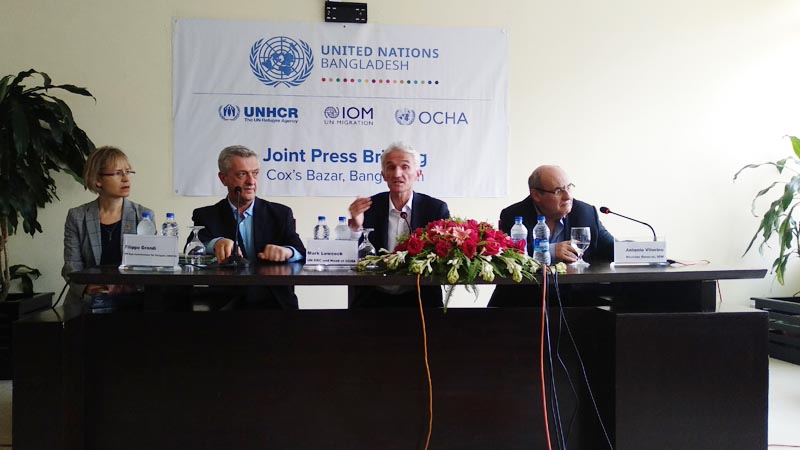Rohingya Repatriation
‘Favourable environment not created yet in Myanmar’

United Nations High Commissioner for Refugees (UNHCR) Filippo Grandi said favourable environment for the return of Rohingyas to Myanmar has not been created yet.
Observing that complexities have arisen centring the implementation of projects taken by Myanmar government to accelerate the return of the Rohingyas, the UNHCR boss said, “In recent times, several rebel groups have been active in Rakhine which is creating obstacles to implementation of the projects. If the recommendations made by the Kafi Anan Commission is not fully implemented, various problems would arise centring the repatriation of Rohingyas.”
He made the observation while visiting the Rohingya refugee camps in Teknaf and Ukhia upazilas of Cox’s Bazar on Friday.
A high profile delegation including UN Under-Secretary-General for Humanitarian Affairs and Emergency Relief Coordinator Mark Lowcock, Director General of the International Organization for Migration (IOM) António Vitorino, and Filippo Grandi jointly visited Cox’s Bazar Thursday and Friday.
The Visiting three top UN officials called on the international community to continue supporting the needs of 1.2 million forcefully displaced Rohingya as well as local community in Cox’s Bazar, said a UNHCR press release.
They reiterated the UN’s commitment to keep working toward safe and sustainable solutions for Rohingya refugees in Myanmar.
“This remains one of the world’s biggest refugee crises,” said Filippo Grandi. “There are more than 900,000 Rohingya refugees in Bangladesh, most of whom fled Myanmar in 2017. I saw a great deal of progress, but their situation, especially for women and children, remains fragile,” he added.
The visit also came just ahead of the cyclone period, which is followed by the monsoon season. Both pose serious risks, including flooding, landslides and disease outbreaks, to thousands of already vulnerable women, men and children, the release said.
While in the camps, they also assessed the ongoing work that has been undertaken to address weather-related risks, including the strengthening of shelters, the improvement of infrastructure, and the training of volunteers.
“We are concerned for the welfare of the Rohingya refugees who live in such vulnerable circumstances in Cox’s Bazar, as well as for host communities which also face significant challenges, particularly in the lead up to the monsoon season,” said António Vitorino.
The UN leaders also met with families who were going through the joint government and UNHCR biometric registration process, receiving documents that for many are a first and that confirm their identity in Bangladesh, as well as enhance their right to access services and protection.
During their visit, the UN top
officials called on Prime Minister Sheikh Hasina, foreign minister Dr AK Abdul Momen and state minister for foreign affairs M Shahriar Alam.




